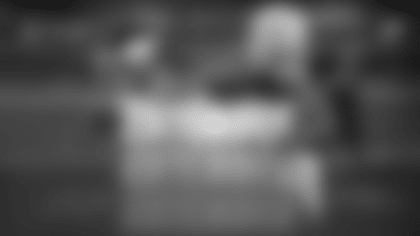If the Dallas Cowboys are the measuring stick for the Eagles in this off-season, as many suggested following the Wild Card playoff loss last week, then Sunday's Cowboys loss to Minnesota gives us all a chance to gain a better measure of the gains needed for your favorite football team. It's probably not a great way to do it, and there is no science behind the opinion, but we've got space to fill and time to kill and, well, here we go.
Call it Rules To Follow In The Off-Season, unofficial version.
*1) Home field is an advantage in the playoffs, and so is a bye week *
Dallas was a totally different team on the road than it was at Cowboys Stadium. The defense didn't have the noise advantage to get off the ball. The Vikings had that advantage and jumped on Tony Romo with six sacks, plenty of pressure and made him look like the jittery, nervous, turnover-prone quarterback of seasons past. Minnesota clearly used the bye week to scout potential playoff teams and the Vikings had the Cowboys covered in just about every area.
Miles Austin, the Pro Bowl receiver who killed the Eagles in the two recent wins, was a non-factor receiver in this game. The interior of the Minnesota defensive line handled Felix Jones and the Dallas running game. That pump-fake-and-delay-draw handoff that seemed to freeze the Eagles defense and that gained so many yards for Dallas' offense? Nothing doing against Minnesota.
*2) The Eagles' defense has more needs than the offense *
Oh, the Eagles have to improve on offense and they go into the off-season knowing there is work to be done. They have to improve up front, they have to get the running game going (more on that later) and they need to do a whole lot better in the red zone. But the defense obviously has more needs, if you are judging solely against Dallas.
The Cowboys' defense is for real. Other than a couple of down-the-field throws to Sidney Rice that went for touchdowns -- and, oh, yeah, the Eagles need to have their receivers play physical football and swat away the Dallas defensive backs, especially Mike Jenkins -- the Cowboys did an excellent job against Brett Favre, against Adrian Peterson and everything the Vikings tried to do offensively.
The difference in this game was Minnesota's defense. The Vikings dominated. They took advantage of right tackle Marc Colombo, something the Eagles really didn't do. They got to Romo right away and made him throw early. They stopped that bubble screen by shooting gaps. The back end of the Vikings' defense, limited by the injury to cornerback Antoine Winfield, played physical football and tackled well.
Pick a spot, any spot, and look to upgrade the defense. Add one or two playmakers here, and get more physical and see how quickly the Eagles match up against Dallas. On a day when Jared Allen had a big sack early and then Dallas shifted its blocking scheme to his side, the rest of the defense picked up the slack. Ray Edwards had three sacks and the Vikings won the battle up front.
One more thing: Minnesota did a great, great, great job tackling in the win. It was a textbook clinic on how to limit big plays.
*3) You win and lose at the line of scrimmage *
This kind of goes hand in hand with the previous Rule, but it's true. Romo rarely looked down the field in the passing game. And you can talk all you want about the running game -- yeah, did you see how Dallas stuck with the running game trailing 17-3 but because Romo couldn't get anything going in the passing game the Cowboys couldn't score? -- but if you don't throw the football and create big plays in the passing game, it is very difficult to score points in this league.
Minnesota did a good job protecting Brett Favre. Even when he was pressured, Favre was smart and he protected the ball well. He created some plays out of nothing.
I know everyone is focused on the quarterback situation here, and on Brian Westbrook and on all of those glamour-position issues the Eagles potentially have in the months ahead. I'm going to look at the line of scrimmage and see what the Eagles do to improve on both sides of the ball there.
* 4) Injuries ARE a factor *
Flozell Adams, the Dallas left tackle, was injured in the first half and a Dallas offense that at least opened the game moving the football well suddenly went nowhere.
No.
Where.
The Eagles played without their starting center, Jamaal Jackson, in two games on the road at Dallas and the effect was startling. An offense that had averaged 29 points per game had no continuity, had trouble communicating up front and really didn't establish a positive identity. This is not to suggest that had Jackson played the Eagles would have won in Dallas. Maybe, maybe not. They would have been improved, without question.
Moving forward, Jackson is an injury question mark. The Eagles had too many moving pieces up front, and they need to establish some togetherness for 2010.
And they need to stay healthy. It makes a difference, for sure.
*5) You need to play an "A" game in the playoffs *
This goes without saying. Dallas turned the ball over early, missed a couple of field goals and blew the chance to gain valuable momentum in a hostile environment. We've seen this happen too many times here. The Eagles commit penalties, drop passes, and do all the things they hadn't done to reach the playoffs.
Whether that is leadership, or talent or simply playing to the level of the game, the Eagles need to improve in their "big-game" efficiency.
*6) The quarterback has to make it all go *
Look at each one of these Divisional playoff games -- heck, look at all of the post-season games historically -- and you see that the winning quarterback plays better than does the losing quarterback. Rarely does it happen the other way. There are a lot of other factors involved, but the quarterback is the guy who makes it all work. The quarterback has to play well and execute the offense and make the right adjustments and sometimes make plays when they aren't there.
Donovan McNabb has won more than his share of playoff games, and in those games he has been the better quarterback. This is a pretty simple fact of football, especially when a team throws the football as much as the Eagles.
Nothing revolutionary here, just a reminder from watching Favre outplay Romo.
*7) The running game has to be reliable *
The Vikings didn't overwhelm Dallas with Peterson, but they kept going to him and then used some play-action passing to score points on big throws vertically. The Eagles have a good group of running backs. They need to know they can hand off one, two, three, six times in a drive and force a defense to respect the running game.
Much of the success of a running game is parts 1 through 6, which equals 7. The Eagles must run the ball better in these games -- in every game -- and they must have the confidence to go to it. More power? I wouldn't call Westbrook a power back. LeSean McCoy is not a power back, but I'm interested to see what his body looks like after a good off-season of work. Will he be a 215-pound hammer with some shake and quickness? Is McCoy someone who can carry the football 20 times every week?
Hey, the Cowboys got their butts kicked all over the field on Sunday and you could just see them wear down to nothing in the second half. They have a very, very good team and Dallas is the team to beat in the NFC East right now.
We saw, though, that Dallas isn't *all that, *particularly when the Cowboys go on the road and play a well-rested, well-prepared team.













